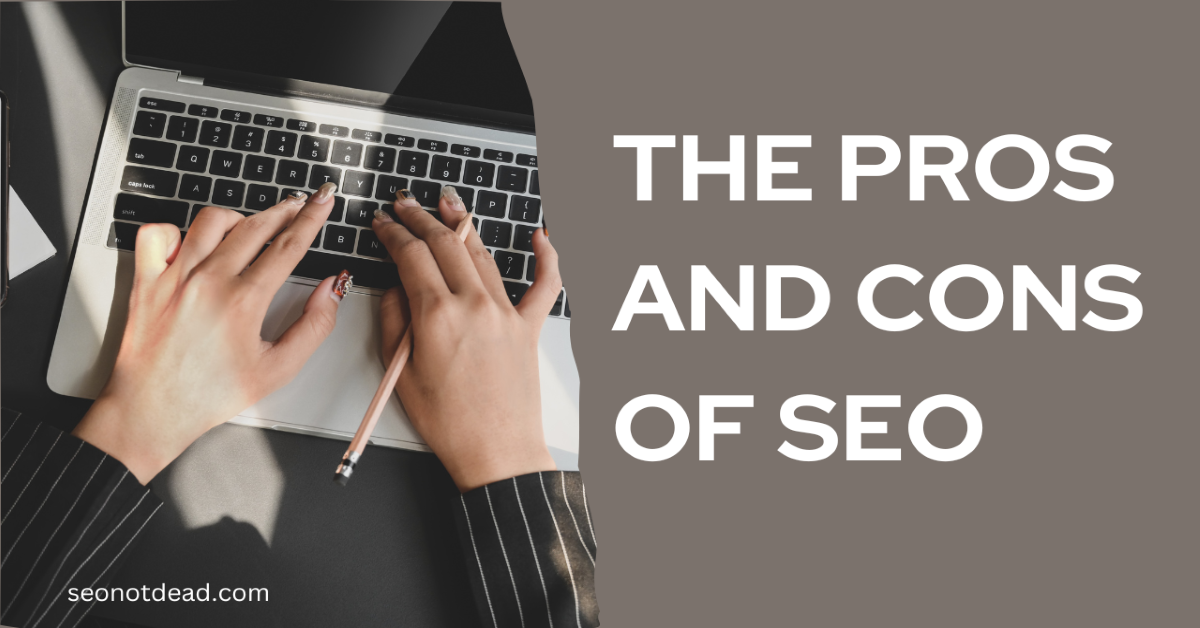You’ve probably heard a lot about SEO lately. Everyone is talking about how important it is for businesses to ensure their website is optimized for search engines. But what does that mean? And more importantly, is it something you should be doing for your business? This blog post will look at SEO’s pros and cons so you can decide if it’s right for you.
The Pros of SEO
There are a lot of good reasons to invest in SEO.
First, it’s a great way to ensure your website is visible to people searching for your products or services. If your website ranks high in search results, you’re more likely to get traffic from potential customers looking for what you offer.

SEO can also be a great way to build trust and credibility with your audience. When people see your website appearing in search results, they’ll know that you’re an authority in your industry. It can help you attract more customers and grow your business.
Finally, SEO can be a great long-term investment. Once you’ve achieved a high ranking in search results, it can be difficult for your competitors to catch up. It means you can continue enjoying SEO’s benefits for years.
Make your brand more visible to potential customers.
If you want people to be able to find your business when they search for relevant keywords, then you need to make sure your website is ranking high in the search results. It is where SEO comes in. By optimizing your website for search engines, you can improve your chances of appearing in the top results for relevant keywords, which means more people will see your brand and be able to learn about what you do.
Provide relevant content for which people are searching.
One of the pros of SEO is that it can help you create content relevant to the search of people. It is because you’ll target specific keywords people use to search for information. It means that your content is more likely to be useful and interesting to your target audience, which can help to improve your brand reputation.
Reach a wider audience
Another advantage of SEO is that it can help you reach a wider audience. It is because when your website appears in the top results for relevant keywords, it’s not just people in your local area who will see it. People worldwide searching for those keywords will see your website, which could lead to new customers and clients from all over.
Generate more leads and sales
One of the main goals of SEO is to generate more leads and sales for your business. By appearing in the top results for relevant keywords, you can attract more visitors to your website who are interested in what you do. It can lead to more sales and inquiries, greatly boosting your business.
Improve the user experience of your website
Another advantage of SEO is that it can help improve your website’s user experience. It’s because when your website is optimized for search engines, it will be faster and easier to use, making people more likely to stay on your site and continue using it. It can also lead to more sales and inquiries, as people are more likely to convert if they have a positive experience on your site.
Boost your business’ overall performance
Finally, SEO can also help to boost your business’s overall performance. A successful SEO strategy can improve the other elements of your online marketing, such as your social media marketing and email marketing. It can lead to a domino effect of more traffic, leads, and sales for your business.
The Cons of SEO
Now that we’ve looked at the pros of SEO let’s look at some potential drawbacks.
Of course, there are also some downsides to SEO that you should be aware of before you start investing in it.

First, achieving high rankings in search results cannot be easy, especially if you’re competing against larger businesses with more resources. Maintaining a high ranking over time can also be time-consuming and expensive.
In addition, the algorithm that determines how websites are ranked in search results is constantly changing, which means that what works today might not work tomorrow. It means one must prepare businesses to adjust their SEO strategies regularly to keep up with the latest changes.
Finally, there is no guarantee that investing in SEO will lead to more sales or revenue for your business. You may invest a lot of time and money into SEO without seeing any return on your investment.
It can be time-consuming.
One of the main disadvantages of SEO is that it can take a lot of time to see results. It can take time to research and implement the necessary changes to your website and even longer for search engines to index and rank your site. It means it’s important to be patient when investing in SEO, as it can take some time to see a return on your investment.
It can be expensive.
Another potential downside of SEO is that it can be quite expensive. It is because hiring an SEO expert or agency can cost money, and you may need to invest in other marketing activities to support your SEO strategy. SEO is not always viable for small businesses or businesses with a limited budget.
You need to keep up with the latest trends.
Another disadvantage of SEO is that it’s important to keep up with the latest trends. The algorithms that search engines use to rank websites are constantly changing, which means that what worked last year might not work this year. It means that you must be prepared to invest time and money into keeping up with the latest trends, or you risk your website being left behind.
Results can be difficult to measure
Another potential drawback of SEO is that results can be difficult to measure. It is because many factors can affect your website’s ranking, and it can be hard to tell which changes have had a positive and negative impact. It means that you must be careful when interpreting your results, as it’s easy to make inaccurate assumptions.
You’re at the mercy of search engines.
Finally, one of the biggest disadvantages of SEO is that you’re at the mercy of search engines. It means that if a search engine decides to change its algorithm, your website could suddenly drop in the rankings. It can be a huge blow to your business, leading to a loss of traffic and inquiries.
You may need to invest in paid advertising.
Another potential disadvantage of SEO is that you may need to invest in paid advertising to see results. It is because organic traffic from search engines can take time to build up, and you may need to supplement it with paid traffic. It can be costly, and it’s important to weigh the pros and cons before deciding whether it’s right for your business.
So, should you invest in SEO for your business?
Ultimately, the decision comes down to whether or not you think the pros outweigh the cons. SEO could be a great option if you invest the time and resources necessary to achieve and maintain a high ranking in search results. However, if you’re not prepared to make that commitment, your business might not be worth it. Only you can decide what’s best for your company.
How to choose the right SEO strategy for your business
As a business owner, you know that SEO is important. But with all the different strategies, how do you know which is right for your business? Choosing an effective and sustainable strategy is important if you’re just getting started with SEO. Here are a few things to keep in mind as you choose an SEO strategy:

What are your goals?
Whether you want to increase brand awareness or drive more traffic to your website, it’s important to set realistic SEO goals. Once you know what you’re hoping to achieve, you can narrow down your options and choose a strategy that is likely to be successful.
What is your budget?
SEO can be costly, so it’s important to consider how much you’re willing to spend. If you’re working with a limited budget, you may need to be more strategic. On the other hand, if money is no object, you can afford to be more experimental.
What are your capabilities?
SEO requires time and effort, so it’s important to ensure you have the resources available to implement a successful strategy. If you’re short on staff or time, choosing a simpler SEO approach may be best. Alternatively, you can pursue more complex SEO tactics if you have a large team and plenty of time.
By keeping these factors in mind, you can choose an SEO strategy tailored to your business goals and needs.
Tips for optimizing your website for better search engine ranking
SEO can be a complex and ever-changing field, but there are some basic tenets that any website owner can follow to help improve their ranking in search engine results pages.

First, make sure your website is well-structured and easy to navigate. It means using clear and descriptive titles for your pages and adding relevant keywords to your content.
Second, create high-quality content that is engaging and informative. SEO algorithms reward websites that offer users a good experience, so it’s important to focus on creating helpful and informative content.
Finally, promote your website through social media and other online channels. These simple tips can help improve your website’s SEO and attract more visitors.
Conclusion
So, those are some of the potential pros and cons of SEO. As you can see, SEO has both good and bad sides, and it’s important to weigh the pros and cons before deciding whether or not it’s right for your business.
If you need help with SEO, we’ve got plenty of resources to help you get started.
- Google Ads Customer Service Woes: An Urgent Call for Improvement - January 17, 2024
- Microsoft Copilot Levels Up: Introducing Copilot Pro for $20/Month - January 17, 2024
- Understanding SEO Perfection According to Google’s John Mueller - January 2, 2024

